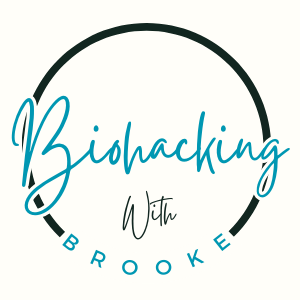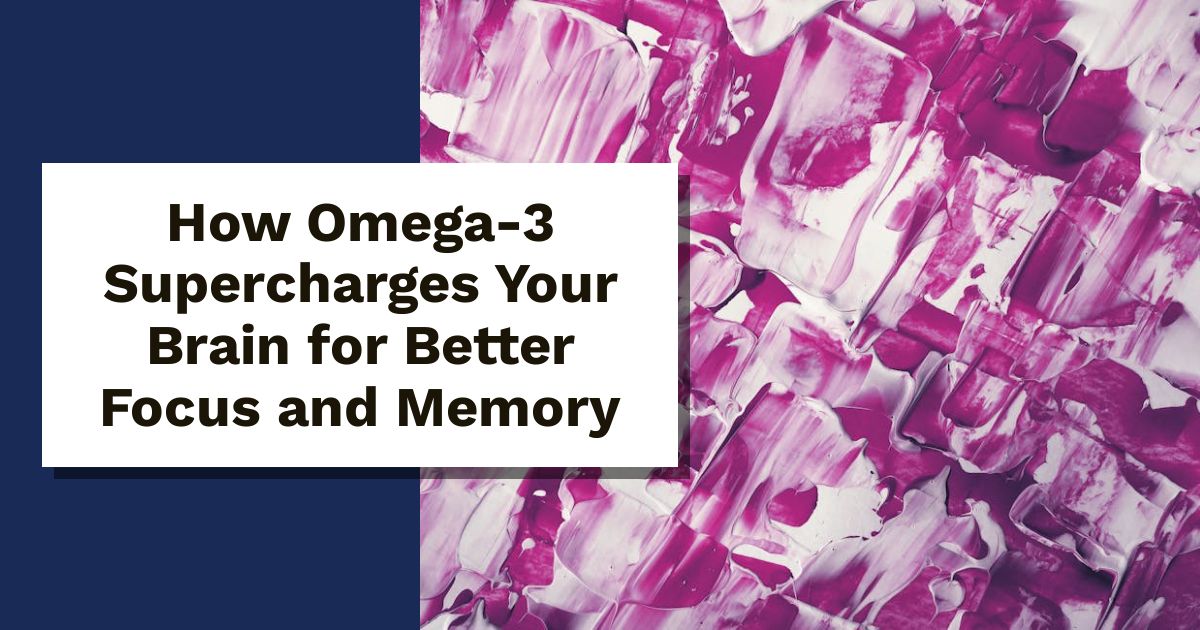Ever feel like your brain’s running on empty? You’re not alone. Cognitive performance isn’t just about solving puzzles—it’s the driving force behind focus, memory, and productivity. That’s where omega-3 steps in. These powerful fats are like fuel for your brain, helping it fire on all cylinders. Curious how this works? Let’s break it down.
Understanding Omega-3 Fatty Acids
Omega-3 fatty acids are a group of polyunsaturated fats vital for brain health. They’re often called “essential fats” because your body can’t make them on its own—you have to get them from food or supplements. These fats serve as building blocks for your brain’s structure and play a key role in cognitive function, making them a key focus for anyone interested in optimizing mental performance.
Types of Omega-3 Fatty Acids
Omega-3s come in three primary types, each with its own unique benefits:
- ALA (Alpha-Linolenic Acid): This plant-based omega-3 is primarily found in flaxseeds, chia seeds, and walnuts. It’s considered a precursor because your body has to convert it into the more active forms—EPA and DHA. Unfortunately, this conversion isn’t super efficient, which is why it’s wise to pair ALA-rich foods with other omega-3 sources.
- EPA (Eicosapentaenoic Acid): Found mainly in fatty fish like salmon and mackerel, EPA is the go-to for reducing inflammation in the brain. Chronic inflammation can lead to cognitive issues, so EPA acts as a protector—like a shield for your neurons. Learn more about EPA and other omega-3s here.
- DHA (Docosahexaenoic Acid): DHA is the reigning champ when it comes to brain health. It makes up a major portion of your brain’s structure, particularly in the cerebral cortex—the part responsible for memory, attention, and problem-solving. Without enough DHA, it’s like trying to run software on outdated hardware. You can dive deeper into DHA’s role here.
Each type plays a distinct yet complementary role in keeping your brain sharp and focused.
Sources of Omega-3
Where can you get these brain-boosting fats? Start with your plate! Omega-3s are abundant in both animal-based and plant-based foods, so finding options that fit your lifestyle is easy.
- Fatty fish: Salmon, mackerel, sardines, and tuna are omega-3 powerhouses, delivering both EPA and DHA. A serving of salmon covers a large chunk of your daily needs. Check out more omega-3-rich fish here.
- Flaxseeds and chia seeds: These tiny superfoods are packed with ALA. Sprinkle them on yogurt or oatmeal for a quick boost.
- Walnuts: These brain-shaped nuts aren’t just a coincidence—they’re loaded with ALA and make a crunchy, healthy snack.
- Fortified foods: Some eggs, milk, and plant-based beverages are fortified with omega-3s. Always check the label to be sure.
- Supplements: If food sources don’t cut it, quality fish oil or algae-based supplements can help fill in the gaps.
For a broader list of omega-3-rich foods, try visiting Healthline’s guide.
By incorporating a mix of these sources, you can easily stay on track to fuel your brain and support optimal cognitive health.
How Omega-3 Boosts Brain Function
Omega-3 fatty acids are like the unsung heroes of cognitive performance. These fats don’t just fuel your brain—they shape its very foundation. From neurotransmitter production to reducing inflammation and keeping your brain cells sturdy, omega-3s do it all. Let’s explore how.
Omega-3 and Neurotransmitter Support
Think of neurotransmitters as your brain’s messaging system. They help cells communicate, which is crucial for focus, mood, and memory. Omega-3, specifically DHA and EPA, plays a critical role in this process. These fatty acids aid in producing neurotransmitters, ensuring your brain’s messages don’t get lost in translation. Thanks to omega-3, neurotransmitter receptors function better, improving everything from mood stabilization to learning ability. Need proof? Studies show that omega-3 supplementation can increase neurotransmitter activity in the brain read more here.
Anti-Inflammatory Benefits
Your brain thrives when it’s inflammation-free. Chronic inflammation messes with your cognitive abilities, leading to brain fog and even long-term memory issues. Enter omega-3, particularly EPA, which has powerful anti-inflammatory properties. It reduces the production of cytokines (inflammatory messengers) and helps in resolving inflammation through molecules like resolvins. For example, diets rich in omega-3s are linked to better inflammatory responses in the brain, keeping you sharp and focused. Skeptical? Here’s more on how omega-3s fight brain inflammation effectively explore here.
Cell Membrane Integrity
Imagine your brain cells as tiny balloons—without strong membranes, they’d collapse under pressure. Omega-3s fortify these membranes, keeping them flexible yet durable. DHA, a key type of omega-3, is a major component of cell membranes in the brain. It ensures that cells can communicate quickly and efficiently. Strong cell membranes mean faster neuron connections, clearer thinking, and better memory. The science backs this up, with omega-3s being directly linked to better membrane fluidity and strength dive deeper here.
Omega-3 fatty acids are like brain grease—keeping the gears of neurotransmission, inflammation control, and cellular structure running smoothly. Stay tuned as we uncover even more ways these essential fats supercharge your mind.
Evidence Linking Omega-3 to Cognitive Performance
Omega-3 fatty acids have been closely studied for their effects on brain function. From enhancing memory to improving mood and protecting long-term cognitive health, these essential fats seem to be a brain’s best friend. Let’s break down the key findings.
Studies on Memory Improvement
Could omega-3s be the secret weapon for a sharper memory? Research certainly suggests so. Studies have demonstrated that DHA, a major omega-3 component, can improve episodic memory—the ability to recall specific events. In particular, DHA supplementation has shown positive effects in young adults whose diets lacked this essential fat. Even in older adults, omega-3s can bolster memory by enhancing reaction time and overall recall ability.
For example, a systematic review found that diets rich in DHA improved memory performance and cognitive response time in healthy individuals read more here. Additionally, omega-3 supplementation has been noted to support memory-related brain functions, especially when combined with a healthy lifestyle check out this study.
Although not all studies show groundbreaking results, the consensus is clear: omega-3s can significantly enhance memory in those with deficits or poor dietary intake.
Impact on Mood and Mental Health
Feeling blue? Omega-3s might brighten your day. These fatty acids not only fuel your brain but also seem to stabilize your emotional state. Chronic low levels of omega-3 are linked to an increased risk of depression, anxiety, and even bipolar disorder. Why? Because EPA and DHA, the primary omega-3s, help maintain the balance of mood-regulating chemicals in your brain.
A study published in the Journal of Psychiatry detailed how higher omega-3 intake improved depressive symptoms and reduced anxiety in participants. Specifically, EPA, when taken as a supplement, was found to be highly effective in mood regulation learn more here. Furthermore, a deficiency in these fats can leave your brain struggling to regulate serotonin and dopamine, which are essential for keeping your spirits up.
In people with diagnosed mood disorders, including depression, omega-3 supplementation has been linked to symptom improvement when taken alongside conventional therapy explore the findings.
Long-Term Cognitive Benefits
Think omega-3 is just for short-term brain boosts? Think again. These fats have profound effects on the brain over the long haul. Omega-3s, particularly DHA, are critical for maintaining the brain’s structure and protecting against cognitive decline with age. Research has found that diets rich in omega-3s support sustained cognitive health and may reduce the risk of neurodegenerative conditions like Alzheimer’s disease.
A large-scale study on older adults revealed that omega-3 intake is tied to better learning, memory retention, and overall cognitive well-being read the findings here. DHA and EPA also support brain plasticity—the ability of the brain to adapt and reorganize throughout life.
Moreover, omega-3s may improve blood flow to the brain, ensuring it receives the oxygen and nutrients it needs to stay sharp as you age check this study out. While more research is needed to fully understand the mechanisms, the evidence so far underscores omega-3’s pivotal role in sustaining brain health for the long term.
From enhancing memory and mood to protecting brain health as you age, omega-3 fatty acids are a neurological powerhouse. Their role in cognitive performance is backed by both science and common sense. As with any lifestyle change, consistency is key—so don’t expect overnight miracles, but do expect a smarter, healthier brain in the years to come.
How to Incorporate Omega-3 into Your Diet
Adding omega-3 to your diet doesn’t have to feel like a chore. Whether you’re a foodie or someone who just wants easy options, there are plenty of ways to boost these essential fats. Read on to explore omega-3-rich foods and whether supplements or whole foods are your best bet.
Top Omega-3 Rich Foods
You don’t need a degree in nutrition to find omega-3-packed eats. Here are some all-star options to kickstart your brain-boosting journey:
- Fatty Fish: Think salmon, mackerel, sardines, and tuna. These are brimming with EPA and DHA, the omega-3s your brain loves. A single serving of salmon can cover much of your daily intake needs. Check out more fish options here.
- Flaxseeds and Chia Seeds: Tiny but mighty, these are plant-based ALA powerhouses. Toss them in your smoothies, sprinkle them over oatmeal, or mix them into baked goods. Pro tip: Ground flaxseeds are easier for your body to absorb.
- Walnuts: Ever notice how walnuts look like tiny brains? That’s nature’s clue—they’re full of ALA omega-3s. Snack on them plain or toss them into salads for a crunch.
- Seaweed and Algae: Not just for sushi lovers! These plant-based sources provide DHA and are an excellent option for vegetarians and vegans.
- Omega-3 Fortified Foods: Some eggs, milk, and juice are fortified with these fatty acids. Perfect for when you’re on the go and need a quick hit.
Want to explore more omega-3-rich foods? This guide has you covered.
Supplements vs. Whole Foods
When it comes to omega-3s, should you go natural or pop a pill? Let’s weigh the pros and cons.
- Whole Foods Win on Diversity: Whole foods like fish and seeds offer more than just omega-3. They’re packed with other nutrients—like protein, fiber, and antioxidants—that work together to keep your brain in top shape. It’s like getting the whole symphony instead of a single instrument read why incorporating whole foods is key.
- Supplements for Specific Needs: Supplements like fish oil or algae oil can help fill gaps if you’re not eating enough omega-3-rich foods. These are especially handy for people with dietary restrictions or health conditions. However, they lack the complementary nutrients found in whole foods. Learn how supplements fit into your lifestyle.
- Bioavailability Matters: The omega-3s in fish and seeds are easier for your body to absorb than those in supplements. Think of whole foods as a premium source and supplements as a backup.
So, what’s the verdict? Aim for a mix. Prioritize omega-3-rich foods, but don’t shy away from supplements when needed. Ultimately, it’s about finding what fits your routine and keeps your brain sharp.
Potential Risks and Considerations
Omega-3s are superstar fats for brain health, but even they come with rules. Just like overwatering a plant can drown it, too much omega-3—or the wrong usage—can backfire. Let’s break it down into manageable chunks so you can make smart choices.
Dosage Recommendations
How much omega-3 should you take? Different people need different amounts, but there are solid starting points. For general brain health, most health organizations recommend 250-500 mg of combined DHA and EPA daily. That’s roughly what you’d get from eating two servings of fatty fish per week. Sound like a lot? Don’t worry, supplements can also bridge the gap if your diet’s lacking.
For specific goals like reducing inflammation or boosting memory, studies suggest that higher doses (up to 1,000 mg daily) may be more effective. But here’s the catch: taking more than 3,000 mg/day without medical advice could increase risks, so stick with guidelines. Start low, then adjust based on your needs—not unlike figuring out your coffee sweet spot. If you’re unsure, check out this detailed dosage guide.
Want to go natural instead? A 3-ounce serving of salmon covers your daily omega-3 needs like a champ. That’s easy to remember, right? For people with specific conditions, it might be worth consulting a doctor or nutritionist for tailored advice—because one size never fits all.
Possible Side Effects
Omega-3 is more friend than foe, but every good thing has its quirks. Overdoing it or taking poor-quality supplements can stir up some side effects. Here’s what to watch for:
- Fishy Burps and Taste: Gross but common. Switching to enteric-coated capsules helps dodge this.
- Stomach Upset: Nausea, diarrhea, or loose stools can crop up, especially with higher doses.
- Bleeding Issues: High omega-3 intake may thin your blood, leading to nosebleeds or longer clotting times.
- Vitamin Overload: Some fish oil supplements are high in vitamin A, which can be toxic in excess.
- Low Blood Pressure: This is a double-edged sword—great for some but risky if you’re already medicated.
The good news? Most side effects are mild and manageable. Simply eating omega-3-rich foods instead of taking supplements can sidestep these problems. Curious for more insights? Explore this list of potential side effects before starting your omega-3 routine.
In rare cases, people allergic to fish or shellfish could react to omega-3 supplements, so tread carefully if that’s you. If you notice symptoms like rashes or breathing difficulties, stop immediately and consult a healthcare provider.
Omega-3 is a brain booster but comes with a few strings attached. Knowing your limits and tailoring intake to your lifestyle can help you get the benefits without the baggage. Stay informed, and you’ll be golden!
Conclusion
Omega-3s are the ultimate brain fuel. From sharpening memory to lifting your mood, they’re key to unlocking peak cognitive performance. These fats don’t just enhance your brainpower—they protect it for the long haul.
Adding omega-3s to your routine is simple, whether it’s through food, supplements, or both. Start small and be consistent. Your brain will thank you.
Ready to give your mind the boost it deserves? Incorporate omega-3 today and see the difference tomorrow. What’s your go-to source for these brain-boosting fats? Let’s hear your favorites!
Brooke is a rock-climbing 🧗♀️, tennis-playing 🎾, biohacking 🧬 bookworm 📚 on a mission to unlock the secrets of health, longevity, and living life to the fullest 🌟. When she’s not scaling cliffs, hitting the courts, or testing out the latest hacks, you’ll find her nose in a book or adventuring with her four-legged best friend 🐕 by her side. With a knack for turning science into simple, actionable tips, Brooke’s writing is your guide to hacking your biology and living your best, most vibrant life!


